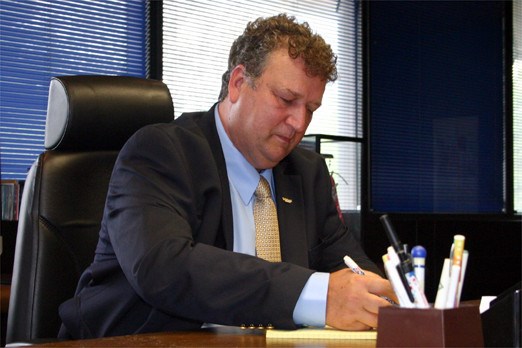An increased effort to encourage more Aboriginal, international and graduate students, as well as the continued push to get law school accreditation will be the immediate focus of Lakehead University over the next year.
Newly installed president Brian Stevenson on Monday said although the university’s Aboriginal population is among the highest in the nation, Lakehead can still do better. That means making their presence known at a much earlier age.
“One of the most serious issues with Aboriginal students is they drop out of high school before we can reach them at the university,” Stevenson said.
“The idea is to start approaching students in the fourth, fifth and sixth grade, starting to show them what the university can do for them, what kind of programs they can be involved in, and trying to develop scholarships specifically for those students.”
By setting aside money now, it will help offset the costs of their education, which can be a burden for many Aboriginal families living at or below the poverty line, he said.
By no means are First Nations students the only source of student growth the school expects to target, Stevenson added.
“At the other end of the spectrum, we want to be able to attract the adult students who have dropped out of high school, gotten their equivalency or have gone to college,” Stevenson said. “Those are the two groups that we’re going to try to attract and also go out there and tell them that the university is open for them.”
Stevenson sees room for rapid growth in Lakehead’s international student population, which today numbers about 100.
The university is regulated by the government in terms of the number of undergraduate students it can enroll, but he sees plenty of room for growth with continued demand for out-of-country post-secondary berths.
“My goal in five or six years is to have about 10 per cent of our students being international students, which would make it somewhere around 1,000 international students. But we still have to work very hard at that because we have less than 100 right now.”
He sees growth potential in not only the arts, but particularly in engineering, business and science.
He’s also like to see more graduate students learning in classrooms and labs throughout the dual-campus school.
And he has not lost hope for a law school, promising to “work hard at that” until the province capitulates and agrees to accredit the university.
As a whole Stevenson would like to see growth continue at about two per cent annually, similar to what the university experienced in 2010.
The 2010 annual report focused more on students and faculty, than it did on numbers, highlighting the achievements of eight current and former enrollees.
For example Derrick Hosanna initiated a volunteer income-tax service for students. The business administration grad, who went on to study law at the University of Alberta, said he was inspired by the corporate taxation courses he took at Lakehead.
“I think Lakehead has some of the best accounting profs in the country. It’s great when our students go up against students from the larger and more prestigious business schools and programs in Canada,” he said.
“The small classes at Lakehead really do make a difference. You meet more people. You interact with your professors more. And it makes learning a lot easier.”
Of course the report does highlight a busy year at the school, including the opening of the university’s Orillia campus in September, the restructuring of the forestry program and its new name, the faculty of natural resources management, the appointment of Stevenson to the presidency and Arthur Mauro as chancellor and numerous awards won by students and staff.
Sign in or register
- Messages
- Post a Listing
- Your Listings
- Your Profile
- Your Subscriptions
- Your Likes
- Your Business
- Support Local News
- Payment History
Registered Users
Already have an account?
New Users
Create a free account.
